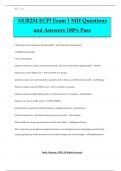Exam (elaborations)
NUR234 ECPI Exam 1 MH Questions and Answers 100% Pass
NUR234 ECPI Exam 1 MH Questions
and Answers 100% Pass
What three factors influence mental health? - •Inherited characteristics
•Childhood nurturing
•Life circumstances
patient is responsive, opens eyes spontaneously, and answers questions appropriately - alert
When does acute PTSD occur...
[Show more]
Preview 3 out of 21 pages
Uploaded on
January 9, 2025
Number of pages
21
Written in
2024/2025
Type
Exam (elaborations)
Contains
Questions & answers
$12.49
Also available in package deal from $128.99
100% satisfaction guarantee
Immediately available after payment
Both online and in PDF
No strings attached
Also available in package deal (1)
$ 275.27
$ 128.99
23 items
1. Exam (elaborations) - Pharmacology test 1 (ecpi) questions and answers 100% pass
2. Exam (elaborations) - Nur234 ecpi exam 1 mh questions and answers 100% pass
3. Exam (elaborations) - Nur 164 final ecpi exam questions and answers 100% pass
4. Exam (elaborations) - Final exam - pharmacology ecpi exam questions and answers 100% pass
5. Exam (elaborations) - Exam 3 (chapters 6-9) a&p i (dr tiangco, ecpi) exam questions and answers 100% pass
6. Exam (elaborations) - Ecpi-exam 2 review chapter 4,5,6,7 questions and answers 100% pass
7. Exam (elaborations) - Ecpi 2025: anatomy & physiology exam: chapters 1-3 questions and answers 100% pass
8. Exam (elaborations) - Ecpi vb nur 168 concepts 3 final review questions and answers 100% pass
9. Exam (elaborations) - Ecpi unit 4 exam questions and answers 100% pass
10. Exam (elaborations) - Ecpi pharmacology exam 3: cholinergics/adrenergics questions and answers 100% pass
11. Exam (elaborations) - Ecpi pharmacology exam 1 questions and answers 100% pass
12. Exam (elaborations) - Ecpi pharm final exam questions and answers 100% pass
13. Exam (elaborations) - Ecpi pathophysiology final exam review questions and answers 100% pass
14. Exam (elaborations) - Ecpi pathophysiology exam 4 questions and answers 100% pass
15. Exam (elaborations) - Ecpi patho exam 1 questions and answers 100% pass
16. Exam (elaborations) - Ecpi nursing a&p2 chapter 20,21,22 questions and answers 100% pass
17. Exam (elaborations) - Ecpi nur165 ch1, 2, 3, 7 questions and answers 100% pass
18. Exam (elaborations) - Ecpi: nur164: chapter 2: theory, research, & evidence-based practice questions and an...
19. Exam (elaborations) - Ecpi nur 138 pharmacology exam 1 questions and answers 100% pass
20. Exam (elaborations) - Ecpi med term final study guide questions and answers 100% pass
21. Exam (elaborations) - Ecpi : anatomy & physiology final cumulative exam: questions and answers 100% pass
22. Exam (elaborations) - Ecpi 2025 human anatomy and physiology 1 final exam questions and answers 100% pass
23. Exam (elaborations) - Ecpi: health assessment final exam questions and answers 100% pass
Show more
1|Page




